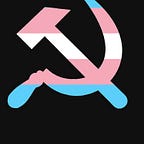Trans Identity and the Maoist Movement
How does gendered oppression arise? The question’s stumped a lot of people with high-and-mighty degrees and mountains of education. The answer is one that we have to come to terms with as organizers, and one that we see often; the oppression of women is one of the first oppressions, and it makes itself known through low wages and thankless household labor. The oppression of women is also one of the hegemony. All gendered activities are enforced by wage reductions, lay-offs, and forcing people back into the reserve army of labor, whether male or female, trans or cis.
Trans people feel severe disconnects between reality as they experience it, and reality as their assigned gender is expected to experience it. They inhabit the no-man’s-land (excuse the gendered term) of gender, one where non-conformity is punished by harassment, unemployment, and frequently murder. Among the communities where I and other trans activists have organized, there is a lot of transphobia. The whole problem comes to a style of organizing termed the mass line. Much of the recent transphobia in leftist organizations has stemmed from misguided attempts to carry out the mass-line, where the revolutionaries do not consult the masses on the ideas they supposedly hold. The integration of trans people into organizing is one way to break the hegemony of gender relations, what Gramsci referred to as the presuppositions of the class in power.
Gender relations are relations of labor. A person who suffers from gender oppression is forced into certain economically precarious grounds, and their whole sphere of material activity is assigned to a category that recognizes their only social value to be their value as a commodity. Trans people and women are prime examples of this concept, the making of a person into a commodity. This may be undertaken with the colonized when it comes to racial oppression, but I am unqualified to speak on the topic. When trans activists organize in their communities, they gain acceptance within the subjected classes, and then they may mold and shape their ideas on gender, and this is the whole point of the mass line theory. The ideas of the masses on gender are not necessarily correct. They are subject to Marxist analysis, and this analysis can help to render the ideas to be more correct through criticism and further study.
No commodity has a value outside of its exchange in present society. This means that without the society determining how useful that thing is in relation to another thing, it cannot be exchanged. Capitalist labor markets depend upon these same concepts. Trans labor is cheaper, and so is more useful, but it is still the same labor. If we look statistically at the wages of trans, colonized, and female employees, they tend to be lower than cis, colonizer, and male employees. It is here where the value system causes a disconnect. I perform the same labor, but because of the way I produce that labor, I may be paid less, passed over for promotion, and so on. Here, the labor of the subaltern is more valuable than that of the dominant class, in its socially useful form, but in its material reality, there is no difference. Thus, the person who is trans, colonized, and so on is taught by society to view themselves as lesser, all because of the way that they are valued on the market of labor.
It is here where trans identity meets Marxist analysis. The only liberation is through the unification of gender oppression with racial oppression, and to unite the revolutionary masses, win over the intermediate, and influence the reactionary. Maoism is the way forwards because it provides a way to eradicate this long-standing gendered system of labor, where people are made into commodities, and all people are for sale. Furthermore, Maoism provides a structure to reduce current suffering for trans people — the mass line. The trans movement cannot succeed alone; we make up a small minority of the population, but if we organize in the masses, we can contribute to the reduction and elimination of gendered oppression through the revolution. This is the only real solution to the problem of gender oppression. Our identities are based upon our sale price in wages, and the most significant considerations in transition are typically financial and social. The revolution solves both of these problems, and organizing towards it may help trans people in accepting themselves, and gaining acceptance from their communities.
